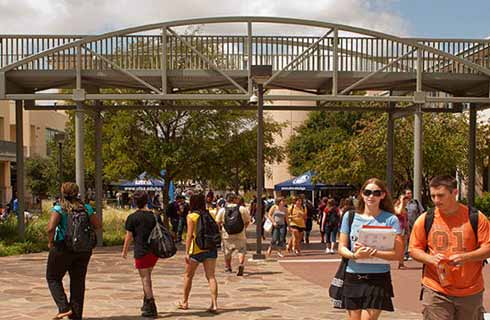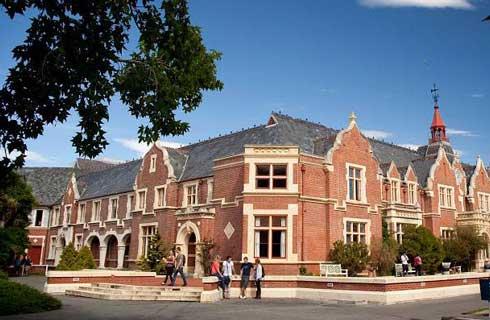理学士(荣誉)环境地球科学
BSc (Hons) Environmental Geoscience

学历文凭
Bachelor Degree with Honours

专业院系
Earth Sciences

开学时间

课程时长

课程学费

国际学生入学条件
IDP—雅思考试联合主办方

雅思考试总分
6.5
- 雅思总分:6.5
- 托福网考总分:80
- 托福笔试总分:
- 其他语言考试:Pearson Academic PTE - 62 (with no less than 59 in each Communicative Skill) Cambridge C2 Proficiency or C1 Advanced - 176 with a minimum of 169 per component
CRICOS代码: F630
申请截止日期: 请与IDP联系 以获取详细信息。
课程简介
Gain the knowledge you need to understand how to manage the Earth, her resources and the environment, and develop the skills to embark on a career in the environmental sector.,Environmental Geoscience is a topical and growing area of study as society increasingly acknowledges the risks of deteriorating environmental conditions to the planet and navigates solutions to protect its future. This BSc connects Earth’s resources with humanity’s response to some of today’s global challenges such as climate change, sustainability and pollution. Our flexible degree puts you in control, giving you both the fundamentals and increased specialisation as you progress through the degree, allowing you to choose a pathway of most interest to you. Combining academic excellence, cutting-edge research and links to industry, the course will equip you with the tools needed for employment in a range of sectors, including environmental management, water management, energy, mining and geotechnics, or for further study or research. The course has a special emphasis on employability and benefits from consultations with experts from the industry, including Amec, Atkins, the Environment Agency, English Nature and Mott MacDonald. You may be able to transfer to the four-year MSci degree in Earth Sciences at the end of your second year. The fourth year combines a bespoke research project in your specialism, with advanced modules designed to integrate your Earth Science knowledge for vocational andor research applications. You can also apply to add a placement year or a year abroad to your degree, increasing the course from three years to four.In the first year, you will develop a fundamental understanding of Earth sciences, mapping skills, remote sensing and data analysis. Year 2 specialises more in environmental aspects, during which you will develop your knowledge of laboratory techniques, sedimentology and climate. In Year 3, you will undertake a research dissertation and also experience working in small groups on an environmental management project of your choice.Course structureYear 1 modulesCore modules:Field Studies explores techniques for description and interpretation of natural geological features. This module also covers mapping skills, and the observation, recording and processing techniques needed for fieldwork and imagery.Understanding Earth Sciences covers an introduction to the areas of petrology, sedimentology, structural geology and palaeontology and relates the processes to the plate tectonic cycle.Environmental Earth Science coversthe Earth’s water cycle in terms of both quantity and quality. You will learn about the composition and materials of the Earth, the mode of formation, distribution and extraction of the Earth's resources and energy.Introductory Data Science introduces the fundamentals of data acquisition and analysis in a geoscientific context. You will learn how to apply computational tools to manipulate and visualise a range of scientific and geospatial data.Sustainability introduces global issues and concepts around sustainability, with an emphasis on aspects most relevant to Earth Sciences such as water, climate, energy and mineral resources, food resources, and natural hazards, and is thematically taught around the United Nations Sustainable Development Goals (SDGs).Optional modules:In recent years, optional modules have included: Mathematical Methods in GeosciencesFurther Mathematics for Geoscientists.Year 2 modulesCore modules:Sedimentary Environments covers the processes involved in the formation of sedimentary rocks and application of the techniques used to analyse these processes and a variety of environments.Isotopes and Climate examineshowstable isotopes can be used in understanding modern environment and climate systems, and in describing major events in the Earth's climate evolution.
相关申请
 预科
预科 奖学金
奖学金 实习机会
实习机会 在校学习
在校学习 跨境学习
跨境学习 校园授课-线上开始
校园授课-线上开始 在线/远程学习
在线/远程学习
开学时间&学费
学费信息仅供参考,请与IDP联系以获取详细信息
| 开学时间 | 时长 | 学费 | 地点 |
|---|
学校排名

世界排名114
数据源:
泰晤士高等教育世界大学排名
关于杜伦大学

杜伦大学创建于1832年,是英国历史最悠久的大学之一。杜伦大学建于中世纪世界遗产地旁,有着悠久的历史和现代价值观,是一座备受推崇并拥有前瞻性思维的学府。如今,来自世界各地的18000多名学生在达勒姆就读。杜伦大学有28个系,开设有200多门本科和研究生课程。该校很多教师都处于各自领域的最前沿。教职人员利用出色的研究和学科知识为所有学生提供优质的教学。目前,杜伦大学有17个学科在全球大学中名列前100位,其中九个学科名列前50位。除了在学术上的卓越成就,该校还努力为学生提供支持,帮助他们在毕业后获得有意义的工作。其毕业生就业能力目前在世界上排名第88位。该校的就业与创业中心致力于培养学生的专业技能,并提供商业人脉和工作机会。杜伦大学目前在2020年《QS世界大学排名》中名列第78位,稳稳跻身全球大学百强之列。该校为教职人员和学生创造了一个热情友好的多元化社交环境,并因此而倍感自豪。目前,杜伦大学28%的在校生为非英国本土学生。大学社区处在独一无二的达勒姆求学体验的核心位置,达勒姆的每个社区均是多元化、多学科的社区,由来自不同背景和文化的学者、学生和工作人员组成。有了这些社区,加上该校杰出的支持体系,学生们一定会有宾至如归之感,并可参与大量精彩的课题。
本校相关课程

博士神学与宗教
学历文凭
Ph.D.
开学日期
课程费用总额


MLitt神学与宗教
学历文凭
Masters Degree (Taught)
开学日期
课程费用总额


博士学位论文博士学位
学历文凭
Ph.D.
开学日期
课程费用总额


理学硕士心理学研究
学历文凭
Masters Degree (Research)
开学日期
课程费用总额


研究心理学硕士
学历文凭
Masters Degree (Research)
开学日期
课程费用总额


博士哲学
学历文凭
Ph.D.
开学日期
课程费用总额

其他相关课程

理学学士(生物多样性和保护)
 弗林德斯大学
弗林德斯大学泰晤士高等教育世界大学排名:307
学历文凭
Bachelor Degree
开学日期
课程费用总额


理学学士-生物多样性和保护(荣誉)
 弗林德斯大学
弗林德斯大学泰晤士高等教育世界大学排名:307
学历文凭
Bachelor Degree with Honours
开学日期
课程费用总额


保护与土地管理文凭
 查尔斯·达尔文大学
查尔斯·达尔文大学泰晤士高等教育世界大学排名:417
学历文凭
Diploma
开学日期
课程费用总额


哲学博士(环境与农业)
 科廷大学
科廷大学泰晤士高等教育世界大学排名:256
学历文凭
Ph.D.
开学日期
课程费用总额


环境政策与管理研究生证书
 阿德莱德大学
阿德莱德大学学历文凭
Graduate Certificate
开学日期
课程费用总额


环境政策与管理研究生文凭
 阿德莱德大学
阿德莱德大学学历文凭
Graduate Diploma
开学日期
课程费用总额










 英国
英国